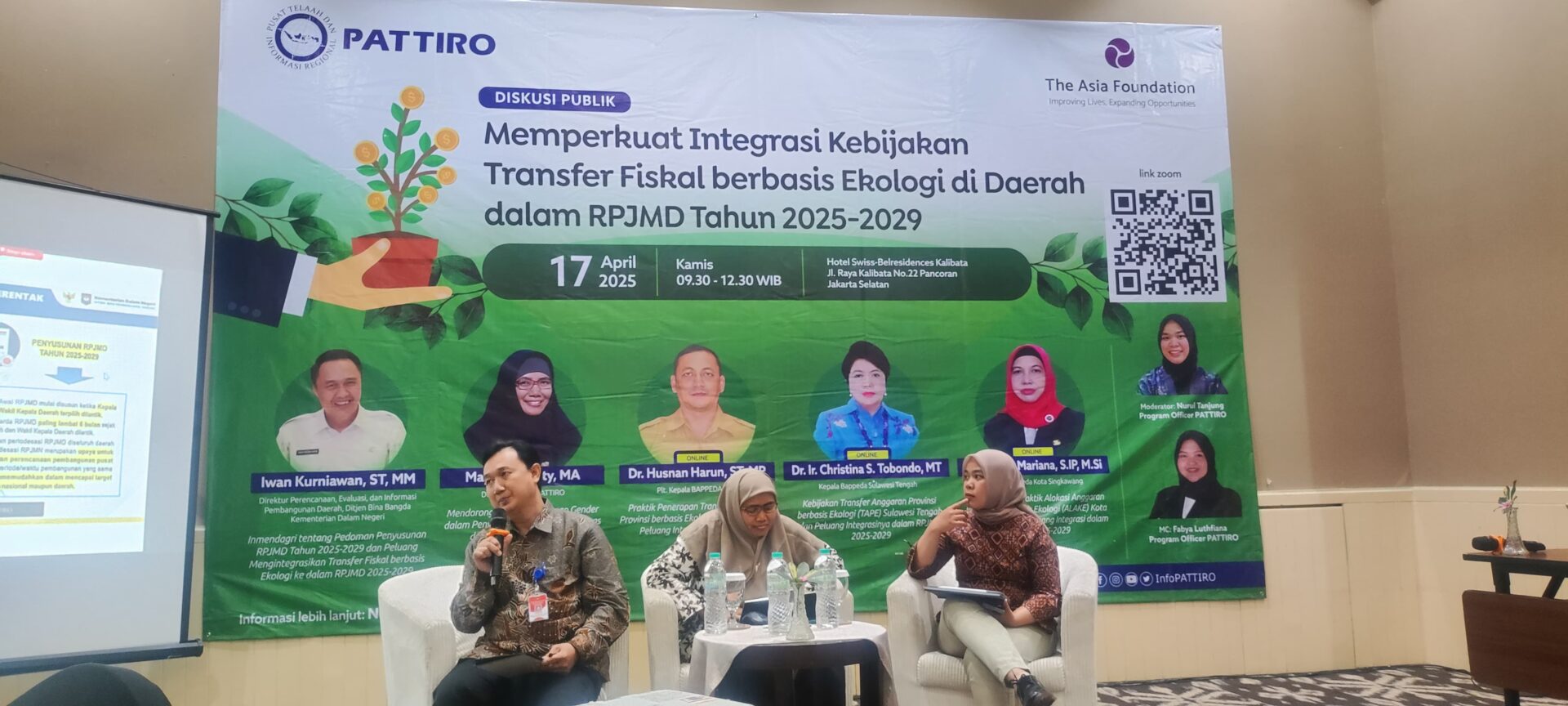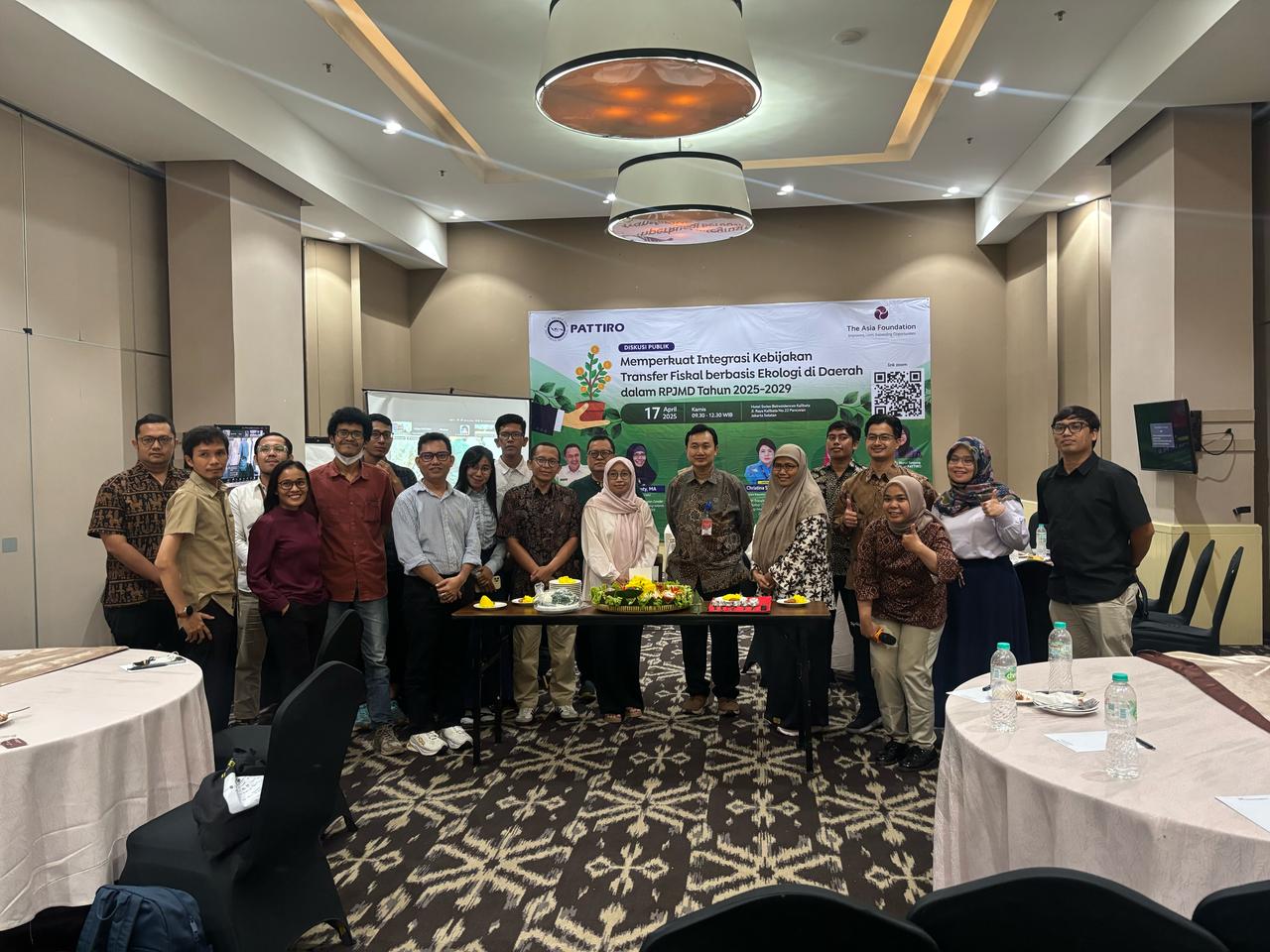Jakarta-the Center for Regional Studies and information (PATTIRO) held a public discussion entitled “Strengthening the integration of ecological-based fiscal Transfer policies in the regions in the 2025-2029 RPJMD” (17/04). The event, which took place in a hybrid manner, presented various speakers from ministries, local governments, and civil society organizations to encourage the institutionalization of Ecological Fiscal Transfer (EFT) into regional planning documents.
The discussion was opened by Ramlan Nugraha, as PATTIRO’s Program Manager, who emphasized that EFT is an important fiscal strategy to address the challenges of the climate crisis, environmental degradation, and the lack of environmental budget allocation in the region. “The 2025-2029 RPJMD is an important momentum to ensure that this policy not only runs ad hoc but is institutionalized structurally. This is not only about the legacy of regional heads, but how to ensure the sustainability of policies that have a direct impact on Environmental Management” ” said Ramlan.
So far, 44 local governments in Indonesia have adopted EFT schemes in the form of ecological-based provincial budget transfers (TAPE), ecological-based district budget transfers (TAKE), and ecological-based Kelurahan budget allocations (ALAKE). Siak regency is one example of good practice in implementing TAKE by encouraging villages to compete to improve environmental performance through a budget scheme based on the Kampung Hijau Index (IKH).
EFT in RPJMD: main strategy, not additional
Policy Analyst Associate expert of the Directorate of Regional Development Planning, Evaluation and information (PEIPD), Regional Development Development, Ministry of Home Affairs Rendy Jaya Laksamana explained that the 2025-2029 RPJMD must be structured in a technocratic and evidence-based manner, and in line with the RPJMN and RPJPN. He emphasized that EFT integration is very possible because it has been listed in the 2025-2029 RPJMN. He also reminded the importance of the RPJMD document as a means of regional struggle to achieve community welfare. “One-third of our state budget is transferred to the regions. That is, if the regional planning document is not good, the development will not be effective, ” he said. He encouraged that green fiscal approaches such as EFT be incorporated into the vision, mission, and performance indicators of the region.
Meanwhile, Maya Rostanty, Pattiro’s Board of Trustees, highlighted that gender mainstreaming must also be integrated in ecological fiscal policy. “We are not only talking about the environment, but also social justice and gender equality as part of Sustainable Development,” said Maya. Therefore, it is necessary to encourage more inclusive environmental policies so that environmental advocacy in the future does not belong to just a few people. In her presentation, Maya also emphasized that sustainable development will not be achieved if half of the population, namely women, are not meaningfully involved. “It is necessary to ensure that women are not only beneficiaries, but also the main actors in decision-making,” adds Maya.
Regional voices: from Aceh province to Singkawang City
In this public discussion, Regional Experiences also enrich the understanding of the integration of EFT policies into the regions. Husnan Harun as the Acting Head of BAPPEDA Aceh province, who attended Online, explained that since 2022, his province has been running TAPE with an initial budget of IDR 5 billion. The focus of Aceh province is not only on the environment, but also education and economic empowerment of women. Through Governor regulation (Pergub) number 00.8/1325 of 2024, Aceh province establishes an ecological-based budgeting while supporting gender mainstreaming. A total of 10% of the total budget is allocated to gender and environmental issues.
Meanwhile, in Central Sulawesi province, Subhan Basir as head of infrastructure and Regional Development, Bappeda of Central Sulawesi province explained that his region had allocated Rp15 billion for the 2025 budget year TAPE. Low-carbon development strategies and environmentally friendly spatial planning are part of the region’s long-term mission. Central Sulawesi province officially included the TAPE scheme in the RPJPD 2025-2045 document and is now integrating it into the RPJMD 2025-2029. This scheme is designed as a funding strategy to encourage programs that support environmental conservation, natural resource conservation, and Disaster Risk Reduction.
Not to forget, Surya Nengsih from Singkawang city government shared the experience of implementing Alake ecological-based village budget scheme that has been integrated in their RPJMD. “We have built a digital system to monitor the performance of kelurahan, including environmental and gender aspects,” he said.
Key message: collaboration and political commitment
In a question and Answer Session, participants from civil society groups highlighted the importance of involving women as actors as well as the importance of synchronization between ecological narratives and budget allocations. The response from the interviewees confirmed that the participation of the public and civil society groups is a key element in the preparation of a fair and sustainable RPJMD.
PATTIRO closed the discussion with three main recommendations:
- Local governments that have implemented EFT need to integrate it into the 2025-2029 RPJMD
- Multi-stakeholder collaboration needed to drive innovative ecological funding
- The central government through Bina Bangda needs to encourage the harmonization of Central and regional policies in the ecological fiscal aspect
The public discussion organized by PATTIRO is a reminder of the importance of EFT integration into the 2025-2029 RPJMD, not only about technical planning, but also about political commitment and alignment on a sustainable future. This cross-sectoral engagement between the government and other civil society groups is an effort to ensure harmonization between Central and local policies and hopes to realize greener and fairer budget governance.
Written by: Fabya Budi Luthfiana (PATTIRO Program Officer)






